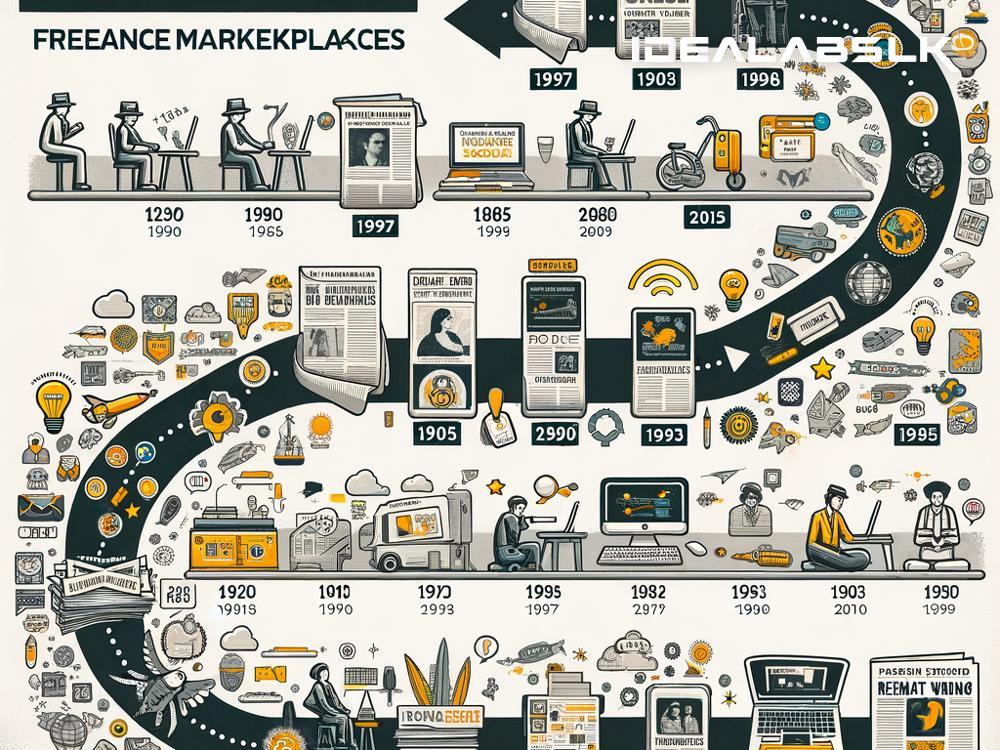The History of Freelance Marketplaces: A Journey Through Time
In today’s digital age, we often hear about freelancers – those brave souls who have decided to carve their own career paths, working on projects they love, from anywhere in the world. At the heart of this freelance revolution are the online platforms that connect freelancers with clients: freelance marketplaces. But how did we get here? Let’s take a stroll down memory lane and explore the fascinating history of freelance marketplaces.
The Early Days
The concept of freelancing isn't new. Historically, freelancers were soldiers-for-hire, willing to lend their combat services to the highest bidder. However, as time progressed, the term began to encompass a wider range of professions, from writers and artists to consultants and programmers.
Pre-internet, finding freelance work was a hustle. Freelancers relied on word-of-mouth, local bulletin boards, and print classified ads in newspapers to find gigs. Then came the internet, and with it, the first iterations of freelance marketplaces in the late 1990s and early 2000s. These early platforms were basic, often just simple websites or forums where jobs could be posted and freelancers could pitch their services.
The Digital Boom
The early 2000s marked the beginning of a digital revolution. The internet became more accessible, and suddenly, people could connect online like never before. This period saw the birth of platforms that would become giants in the freelance marketplace world, such as Elance (founded in 1999) and oDesk (founded in 2003). These platforms introduced more structured systems, allowing freelancers to create profiles, showcase their portfolios, and bid on projects. The idea was simple yet revolutionary: to create a global marketplace where anyone could find and hire freelancers from anywhere.
As technology advanced, so did these platforms. They started offering more sophisticated features, including robust rating systems, secure payment gateways, and better match-making algorithms to connect the right freelancers with the right clients. This not only made the hiring process smoother but also helped build trust in online work arrangements.
The Rise of the Gig Economy
The 2010s can be considered the golden age of the freelance marketplace. The success of platforms like Elance and oDesk (which merged in 2013 to form Upwork) paved the way for a plethora of niche and generalist platforms catering to different industries and skills, such as Fiverr, Freelancer, and Toptal. This period also saw the rise of the gig economy—a cultural shift toward temporary positions and short-term contracts as opposed to traditional, permanent jobs.
Fuelled by advancements in technology, an increasing desire for work-life balance, and the allure of being your own boss, more and more people started freelancing. In response, businesses of all sizes began to recognize the advantages of hiring freelancers for specific projects. The flexibility, diversity of skill sets, and potential cost savings compared to hiring full-time employees were hard to ignore.
The Present and Beyond
Today, freelance marketplaces are more than just platforms for hiring freelancers—they are thriving communities where freelancers can learn, grow, and connect with peers. Many offer educational resources, forums, and even personal branding tools to help freelancers succeed. The COVID-19 pandemic accelerated the acceptance of remote work, pushing more businesses and individuals to embrace freelancing, thereby increasing demand on these platforms.
The future of freelance marketplaces looks promising. Artificial intelligence and blockchain technology are set to revolutionize how we work, making processes more efficient and secure. As we move forward, we can expect these platforms to offer more personalized and engaging experiences, further blurring the lines between traditional employment and freelancing.
Conclusion
The history of freelance marketplaces is a testament to human ingenuity and adaptability. From humble beginnings to multi-billion dollar companies, these platforms have transformed the way we work and live. As we look to the future, one thing is clear: the freelance marketplace is here to stay, and it will continue to evolve, offering new opportunities for both freelancers and businesses alike. So, whether you’re a seasoned freelancer or someone considering taking the leap, now is an exciting time to be part of this ever-changing landscape.

